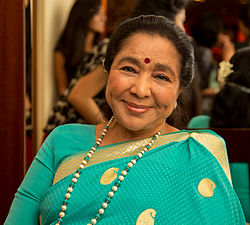
Asha Bhosle was born 8 September 1933 commonly referred to as Ashaji. Bhosle's career started in 1943 and has spanned over six decades. She has done playback singing for over a thousand Bollywood movies. In addition, she has recorded several private albums and participated in numerous solo concerts in India and abroad. Bhosle is the sister of playback singer Lata Mangeshkar.
At that time, prominent playback singers like Geeta Dutt, Shamshad Begum and Lata Mangeshkar dominated the singing for the female lead and the big films. Asha used to get the assignments they refused: singing for the bad girls and vamps, or songs in the second-grade movies. In the 1950s, she sang more songs than most playback singers in Bollywood (not counting Lata). Most of these were in low budget B or C-grade films. Her earliest songs were composed by A R Qureshi, Sajjad Hussain and Ghulam Mohammed, and most of these songs failed to do well. Singing in Sangdil (1952), composed by Sajjad Hussain, she got reasonable recognition. Consequently, film director Bimal Roy gave her a chance to sing in Parineeta (1953). Raj Kapoor signed her to sing "Nanhe Munne Bachche" withMohammed Rafi in Boot Polish (1954), which gained popularity.
O. P. Nayyar gave Asha a break in C.I.D. (1956). She first achieved success in B. R. Chopra's Naya Daur (1957), composed by him. Her duets with Rafi like "Maang Ke Saath Tumhara", "Saathi Haath Badhana" and "Uden Jab Jab Zulfein Teri", penned by Sahir Ludhianvi, earned her recognition. It was the first time she sang all the songs for a film's leading actress. Chopra approached her for several of his later productions, including Gumrah (1963), Waqt (1965), Hamraaz (1965),Aadmi Aur Insaan (1966) and Dhund (1973). Nayyar's future collaboration with Bhosle also resulted in success. Gradually, she established her status and received the patronage of such composers as Sachin Dev Burman and Ravi. Bhosle and Nayyar had a professional and personal parting of ways in the 1970s.
In 1966, Bhosle's performances in the duets from one of music director R.D. Burman's first soundtracks, for the movie Teesri Manzil, won popular acclaim. Reportedly, when she first heard the dance number "Aaja Aaja", she felt she would not be able to sing this westernised tune. While Burman offered to change the music, she refused, taking it as a challenge. She completed the song after ten days of rehearsals, and "Aaja Aaja", along with such other songs as "O Haseena Zulfonwali" and "O Mere Sona Re" (all three duets with Rafi), became successful. Shammi Kapoor, the film's leading actor, was once quoted as saying– "If I did not have Mohammad Rafi to sing for me, I would have got Asha Bhosle to do the job". Bhosle's collaboration with Burman resulted in numerous hits and a marriage. During the 1960-70s, she was the voice of Bollywood's actress and dancer,Helen, on whom "O Haseena Zulfon Wali" was picturised. It is said that Helen would attend her recording sessions so that she could understand the song better and plan dance steps accordingly. Some of their other popular numbers include "Piya Tu Ab To Aaja" (Caravan) and "Yeh Mera Dil" (Don), among others.
By the 1980s, Bhosle, although highly regarded for her abilities and versatility, had sometimes been stereotyped as a "cabaret singer" and a "pop crooner". In 1981 she attempted a different genre by singing several ghazals for the Rekha-starrer Umrao Jaan, including "Dil Cheez Kya Hai", "In Aankhon Ki Masti Ke", "Yeh Kya Jagah Hai Doston" and "Justaju Jiski Thi". The film's music director Khayyam, had lowered her pitch by half a note. Bhosle herself expressed surprise that she could sing so differently. The ghazals won her the first National Film Award of her career. A few years later, she won another National Award for the song "Mera Kuchh Saamaan" from Ijaazat (1987).
In 1995, 62-year-old Bhosle sang for actress Urmila Matondkar in the movie Rangeela. The soundtrack featured songs like "Tanha Tanha" and "Rangeela Re" sung by her, and composed by music director A. R. Rahman, who would go on to record several songs with her. During the 2000s, several of Bhosle's numbers became chartbusters, including "Radha Kaise Na Jale" from Lagaan (2001), "Kambakht Ishq" from Pyaar Tune Kya Kiya (2001), "Yeh Lamha" from Filhaal (2002), "Lucky Lips" from Lucky (2005). In October 2004, The Very Best of Asha Bhosle, The Queen of Bollywood, a compilation album of songs recorded by Bhosle for albums and Bollywood films that were released between 1966 and 2003, was released.
In 2013, Bhosle debuted in the film Mai in the title role, at the age of 79. Bhosle played the role of a 65-year-old mother who suffers from Alzheimer's disease and is abandoned by her children. She received positive reviews for her acting as well from critics.
In 2011, she was officially acknowledged by the Guinness Book of World Records as the most recorded artist in music history. The Government of India honoured her with the Dadasaheb Phalke Award in 2000 and the Padma Vibhushan in 2008.
- 1968: "Garibon ki Suno" (Dus Lakh, 1966)
- 1969: "Parde Mein Rehne Do" (Shikar, 1968)
- 1972: "Piya Tu Ab To Aaja" (Caravan, 1971)
- 1973: "Dum Maro Dum" (Hare Rama Hare Krishna, 1972)
- 1974: "Hone Lagi Hain Raat" (Naina, 1973)
- 1975: "Chain Se Humko Kabhi" (Pran Jaye Par Vachan Na Jaye, 1974)
- 1979: "Yeh Mera Dil" (Don, 1978)
Special Award
- 1996 – Special Award (Rangeela, 1995)
Lifetime Achievement Award
- 2001 – Filmfare Lifetime Achievement Award
National Film Awards
- 1981: Dil Cheez Kya Hai (Umrao Jaan)
- 1986: Mera Kuch Samaan (Ijaazat)
No comments:
Post a Comment